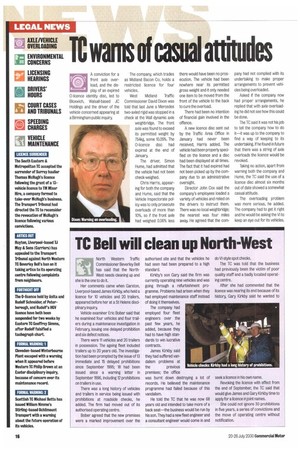IC warns of casual attitudes
Page 18

If you've noticed an error in this article please click here to report it so we can fix it.
A conviction for a front axle overload, and the display of an expired 0-licence identity disc, led to Bloxwich, Walsall-based JC Holdings and the driver of the vehicle concerned appearing at a Birmingham public inquiry. The company, which trades as Midland Bacon Co, holds a restricted licence for four vehicles.
West Midland Traffic Commissioner David Dixon was told that last June a Mercedes two-axled rigid was stopped in a check at the Wall dynamic axle weighbridge. The front axle was found to exceed its permitted weight by 154k9, some 10.05%. The 0-licence disc had expired at the end of January.
The driver, Simon Hume, had admitted that the vehicle had not been check-weighed.
Chris Harris, appearing for both the company and Hume, said that the Vehicle Inspectorate policy was to only prosecute overloads of more than 10%, so if the front axle had weighed 0.06% less there would have been no prosecution. The vehicle had been nowhere near its permitted gross weight and it only needed one item to be moved from the front of the vehicle to the back to cure the overload.
There had been no intention of financial gain involved in the offence.
A new licence disc sent out by the Traffic Area Office in January had never been received, Harris added. The vehicle had been properly specified on the licence and a disc had been displayed at all times. The fact that it had expired had not been picked up by the company due to an administrative oversight.
Director John Cox said the company's employees loaded a variety of vehicles and relied on the drivers to instruct them. There was no local weighbridge; the nearest was four miles away. He agreed that the com
pany had not complied with its undertaking to make proper arrangements to prevent vehicles being overloaded.
Asked if the company now had proper arrangements, he replied that with axle overloading he did not sec how this could be done.
The TC said it was not his job to tell the company how to do it—it was up to the company to find a way of keeping to its undertaking. If he found in future that there was a string of axle overloads the licence would be revoked.
Taking no action, apart from warning both the company and Hume, the TC said the use of a licence disc almost six months out of date showed a somewhat casual attitude.
The overloading problem was more serious, he added. The company had to get it right and he would be asking the VI to keep an eye out for its vehicles.




















































































































